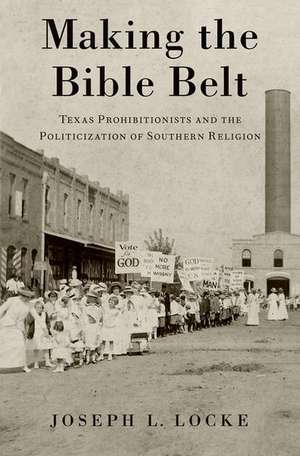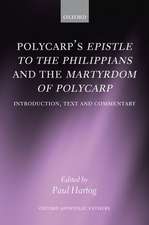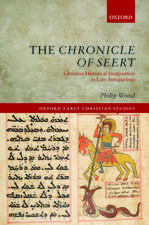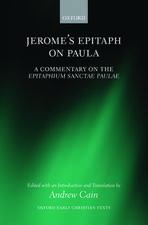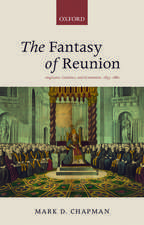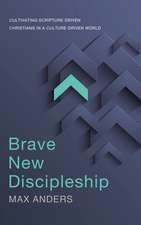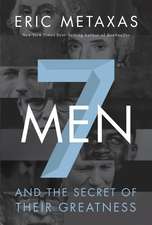Making the Bible Belt: Texas Prohibitionists and the Politicization of Southern Religion
Autor Joseph Lockeen Limba Engleză Hardback – 27 iul 2017
Preț: 282.63 lei
Preț vechi: 332.80 lei
-15% Nou
Puncte Express: 424
Preț estimativ în valută:
54.09€ • 56.04$ • 45.14£
54.09€ • 56.04$ • 45.14£
Carte tipărită la comandă
Livrare economică 10-17 martie
Preluare comenzi: 021 569.72.76
Specificații
ISBN-13: 9780190216283
ISBN-10: 019021628X
Pagini: 296
Ilustrații: 13 hts
Dimensiuni: 236 x 157 x 28 mm
Greutate: 0.52 kg
Editura: Oxford University Press
Colecția OUP USA
Locul publicării:New York, United States
ISBN-10: 019021628X
Pagini: 296
Ilustrații: 13 hts
Dimensiuni: 236 x 157 x 28 mm
Greutate: 0.52 kg
Editura: Oxford University Press
Colecția OUP USA
Locul publicării:New York, United States
Recenzii
... Locke's study of Texas politics in the Prohibition era adds another strategic piece to the puzzle in understanding its historical contours... Highly recommended.
Only a few monographs force historians to reconsider something we all 'know.' Making the Bible Belt is one of those books. Joseph Locke argues convincingly that the critical role played by clericalism in the political life of Texas, rather than having always been present, actually dates only from the era of prohibition. Texas did not join the Bible Belt until the battle against alcohol allowed clericalism to overcome a long-standing tradition of anticlericalism and give religion its currently pervasive role in the state's public life.
In this bold and informative book Locke poses a vital question: How did the religious world of late-nineteenth century Texas--freewheeling, iconoclastic, and skeptical of preachers in politics--become in the twentieth century a hub of the Bible Belt, with its conformist 'Texas Theology' and politically aggressive church establishment? His answers will be of value to anyone interested in the history and current role of religion in American politics.
Many talk of the Bible Belt, but few understand its origins. Joseph Locke's book describes a forgotten anti-clerical culture in Texas, then explains the emergence of political preachers, provides an insightful account of the fight over prohibition there, and demonstrates the importance of a neglected historical figure-Senator Morris Sheppard. Locke's fascinating book reveals how conservative evangelicals came to exercise such influence in America. It tells a compelling story that explains the past and speaks to the present.
With rigor and flair, Joseph Locke shatters the presumption, passed down by generations of pundits and scholars, that the South has always been the Bible Belt, a natural hothouse of fundamentalist zeal. It was only through the relentless crusading of a rising clerical class, capped off by the political triumph over rum, that the region we now recognize as evangelical orthodoxy's dominant hub assumed its reigning religiosity. This is a beautifully crafted book by a talented historian.
By highlighting the important role of clericalism in the Texas prohibition campaigns, Joseph L. Locke has given us a new and useful way to think about the relationship between religious and political institutions in Texas, in the Bible Belt, and in the nation as a whole. That is no small accomplishment.
Crisply written and studiously documentedMaking the Bible Beltpresents a compelling argument[about] late nineteenth-and early-twentieth-century Texas, revealing a contentious, competitive religious milieu.
Many people mistakenly believe the American South was always a hotbed of religious fervor. In his meticulously researched andartfully written Making the Bible Belt, Joseph L. Locke demonstrates how recent a development the Bible belt phenomenon is and tracesit to determined opposition of church people to anticlericalism in the late nineteenth and early twentieth centuries.
This book should be required reading for anyone wishing to assess patterns enacted by elements of the Christian church that engage themselves in political rhetoric and the lust for power that comes from wishing to dictate cultural morality. Locke does a fantastic job ordering historical material in a way that the reader feels as if they are reading a book about a contemporary social concern, all the while explaining the foundation of the "Bible Belt" in the late nineteenth and early twentieth century.
Joseph L. Locke's eye-opening monograph shatters erroneous and too-long-held assumptions regarding the role of religion in Texas political history...This nuanced volume should be read closely not just by historians of American religion, but political scientists and sociologists as well.
Only a few monographs force historians to reconsider something we all 'know.' Making the Bible Belt is one of those books. Joseph Locke argues convincingly that the critical role played by clericalism in the political life of Texas, rather than having always been present, actually dates only from the era of prohibition. Texas did not join the Bible Belt until the battle against alcohol allowed clericalism to overcome a long-standing tradition of anticlericalism and give religion its currently pervasive role in the state's public life.
In this bold and informative book Locke poses a vital question: How did the religious world of late-nineteenth century Texas--freewheeling, iconoclastic, and skeptical of preachers in politics--become in the twentieth century a hub of the Bible Belt, with its conformist 'Texas Theology' and politically aggressive church establishment? His answers will be of value to anyone interested in the history and current role of religion in American politics.
Many talk of the Bible Belt, but few understand its origins. Joseph Locke's book describes a forgotten anti-clerical culture in Texas, then explains the emergence of political preachers, provides an insightful account of the fight over prohibition there, and demonstrates the importance of a neglected historical figure-Senator Morris Sheppard. Locke's fascinating book reveals how conservative evangelicals came to exercise such influence in America. It tells a compelling story that explains the past and speaks to the present.
With rigor and flair, Joseph Locke shatters the presumption, passed down by generations of pundits and scholars, that the South has always been the Bible Belt, a natural hothouse of fundamentalist zeal. It was only through the relentless crusading of a rising clerical class, capped off by the political triumph over rum, that the region we now recognize as evangelical orthodoxy's dominant hub assumed its reigning religiosity. This is a beautifully crafted book by a talented historian.
By highlighting the important role of clericalism in the Texas prohibition campaigns, Joseph L. Locke has given us a new and useful way to think about the relationship between religious and political institutions in Texas, in the Bible Belt, and in the nation as a whole. That is no small accomplishment.
Crisply written and studiously documentedMaking the Bible Beltpresents a compelling argument[about] late nineteenth-and early-twentieth-century Texas, revealing a contentious, competitive religious milieu.
Many people mistakenly believe the American South was always a hotbed of religious fervor. In his meticulously researched andartfully written Making the Bible Belt, Joseph L. Locke demonstrates how recent a development the Bible belt phenomenon is and tracesit to determined opposition of church people to anticlericalism in the late nineteenth and early twentieth centuries.
This book should be required reading for anyone wishing to assess patterns enacted by elements of the Christian church that engage themselves in political rhetoric and the lust for power that comes from wishing to dictate cultural morality. Locke does a fantastic job ordering historical material in a way that the reader feels as if they are reading a book about a contemporary social concern, all the while explaining the foundation of the "Bible Belt" in the late nineteenth and early twentieth century.
Joseph L. Locke's eye-opening monograph shatters erroneous and too-long-held assumptions regarding the role of religion in Texas political history...This nuanced volume should be read closely not just by historians of American religion, but political scientists and sociologists as well.
Notă biografică
Joseph Locke is an Assistant Professor of History at the University of Houston-Victoria.
